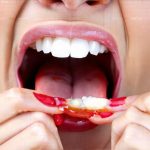The digestive system is a remarkably complex machine, often taken for granted until something goes awry. We typically associate digestive issues with what we eat, focusing on food intolerances or dietary excesses. However, the process begins long before food reaches the stomach; it starts in the mouth, and more specifically, with the act of chewing. Insufficient chewing isn’t merely a matter of etiquette; it profoundly impacts how our bodies break down food, absorb nutrients, and ultimately, the consistency of our stools. Many people unknowingly experience subtle digestive discomfort – including frequent soft stools – as a direct result of habitually minimizing chewing effort, prioritizing speed over thorough mastication in their eating habits.
This seemingly minor habit can have surprisingly far-reaching consequences. When food isn’t adequately broken down mechanically (through chewing) it places a greater burden on subsequent stages of digestion, forcing the stomach and intestines to work harder. This incomplete breakdown not only hinders nutrient absorption but also alters the composition of the stool itself, often leading to looser, softer formations. It’s a domino effect where a simple change in behaviour can significantly influence digestive health, and recognizing this connection is the first step toward improvement. Understanding why minimal chewing effort leads to soft stools requires exploring the intricacies of digestion and the vital role mechanical breakdown plays within it. You may find more information about how habits impact stool consistency with soft-stools caused by artificial sweetener overuse.
The Mechanics of Digestion & Chewing’s Role
Digestion isn’t a single event but rather a sequential process that unfolds across the entire gastrointestinal tract. It begins in the mouth, where mastication – the act of chewing – initiates mechanical digestion. This isn’t just about reducing food particle size; it’s also about increasing surface area for enzymatic action. Saliva, containing the enzyme amylase, starts breaking down carbohydrates while you chew. Properly chewed food is easier to swallow, travels more smoothly through the esophagus, and allows the stomach to process it with greater efficiency. The stomach’s primary role isn’t necessarily to break down food further (though it does some), but rather to mix it with gastric juices and regulate its release into the small intestine.
When food arrives in the small intestine relatively intact due to inadequate chewing, several issues can arise. The pancreas releases enzymes to break down proteins, fats, and carbohydrates, but these enzymes work most effectively on food that’s already been mechanically broken down. If the food particles are large, enzymatic action is less efficient, leading to malabsorption of nutrients and undigested food moving more rapidly into the colon. This rapid transit time doesn’t allow for sufficient water absorption in the large intestine, resulting in softer stools. Furthermore, larger food particles can ferment in the colon, creating gas and bloating – common accompaniments to soft stool consistency. If you experience frequent issues with digestion after meals, consider if meal delivery habits are a contributing factor.
The connection between chewing and stool consistency is often underestimated because it’s not a dramatic symptom like acute pain. Instead, it’s a gradual decline in digestive efficiency that manifests as chronic softness or looseness. The body attempts to compensate for the incomplete digestion elsewhere in the system, potentially leading to other digestive complaints over time. The quality of your chewing directly impacts the quality of your stool.
Why We Tend to Chew Less
Modern life often encourages – and even rewards – speed. We’re constantly bombarded with stimuli and pressured for time, which translates into rushed meals. This leads to a subconscious reduction in chewing effort as we prioritize finishing our food quickly. Many individuals also report that certain foods require less perceived “effort” to chew, such as softer or processed options, inadvertently reinforcing the habit of minimal mastication. Beyond lifestyle factors, there are other contributing elements:
- Habitual Eating: We develop ingrained eating patterns over time. If you’ve consistently minimized chewing throughout your life, it becomes a deeply rooted habit that requires conscious effort to break.
- Distractions: Eating while watching TV, scrolling through social media, or working can significantly reduce our awareness of how thoroughly we’re chewing. Our attention is elsewhere, and the mechanical breakdown of food takes a backseat.
- Dental Issues: Problems with teeth or jaw alignment can make chewing uncomfortable or difficult, leading to less thorough mastication as a natural response. This isn’t necessarily about laziness; it’s about physical limitation. It’s important to rule out other causes of digestive discomfort such as loose stools caused by frequent reheating of leftovers.
Restoring Chewing Habits & Dietary Considerations
Reintroducing mindful chewing into your routine requires conscious effort and consistency. It’s not about drastically changing your diet overnight but rather focusing on how you eat, not just what you eat. A practical starting point is to consciously slow down during mealtimes. Aim for at least 20-30 chews per bite, especially with denser foods like vegetables and proteins. Pay attention to the texture of your food as it breaks down – this helps increase awareness and encourages more thorough chewing.
Beyond mindful eating, consider these steps:
1. Eliminate Distractions: Create a dedicated eating environment free from screens and other interruptions.
2. Focus on Texture: Choose foods that require more chewing effort (raw vegetables, nuts, whole grains) to naturally encourage greater mastication.
3. Hydration: Drinking water between bites can help soften food and make it easier to chew.
Dietary adjustments can also play a supporting role. Reducing highly processed foods – which often require minimal chewing anyway – and increasing your intake of fiber-rich foods (fruits, vegetables, whole grains) provides more bulk and encourages better digestive function overall. Remember, improving stool consistency isn’t solely about chewing; it’s about optimizing the entire digestive process. Sometimes changes in diet can cause issues, so be aware of low starch meal choices and their impact.
The Gut Microbiome & Chewing Connection
The gut microbiome – the trillions of bacteria residing in our intestines – plays a crucial role in digestion, immunity, and overall health. Inadequate chewing can indirectly impact the microbiome by altering the types of carbohydrates that reach the colon. When food isn’t properly broken down into smaller molecules, more complex carbohydrates (resistant starches) become available for fermentation by gut bacteria. While some degree of fermentation is healthy – producing beneficial short-chain fatty acids – excessive fermentation due to undigested food can lead to gas, bloating, and changes in stool consistency.
A healthier microbiome thrives on diversity. Thorough chewing promotes a more balanced breakdown of carbohydrates, providing different types of fuel for various bacterial populations. This leads to a more robust and resilient gut ecosystem. Furthermore, the act of chewing itself stimulates saliva production, which contains antibacterial compounds that can help regulate the microbial balance in the mouth and early stages of digestion. A healthy oral microbiome contributes to a healthier gut microbiome overall. Consider how fruit juice cleansing trends might impact your own digestive system as well.
The link between chewing, the gut microbiome, and stool consistency is an area of ongoing research, but it’s becoming increasingly clear that these factors are interconnected. Optimizing your chewing habits isn’t just about better digestion; it’s about fostering a thriving internal ecosystem. If you frequently experience digestive issues alongside stress, exploring long-term stress exposure as a potential cause could be beneficial. Prioritizing mindful eating and adequate mastication can be a simple yet powerful step towards improved digestive health and overall wellbeing.


















